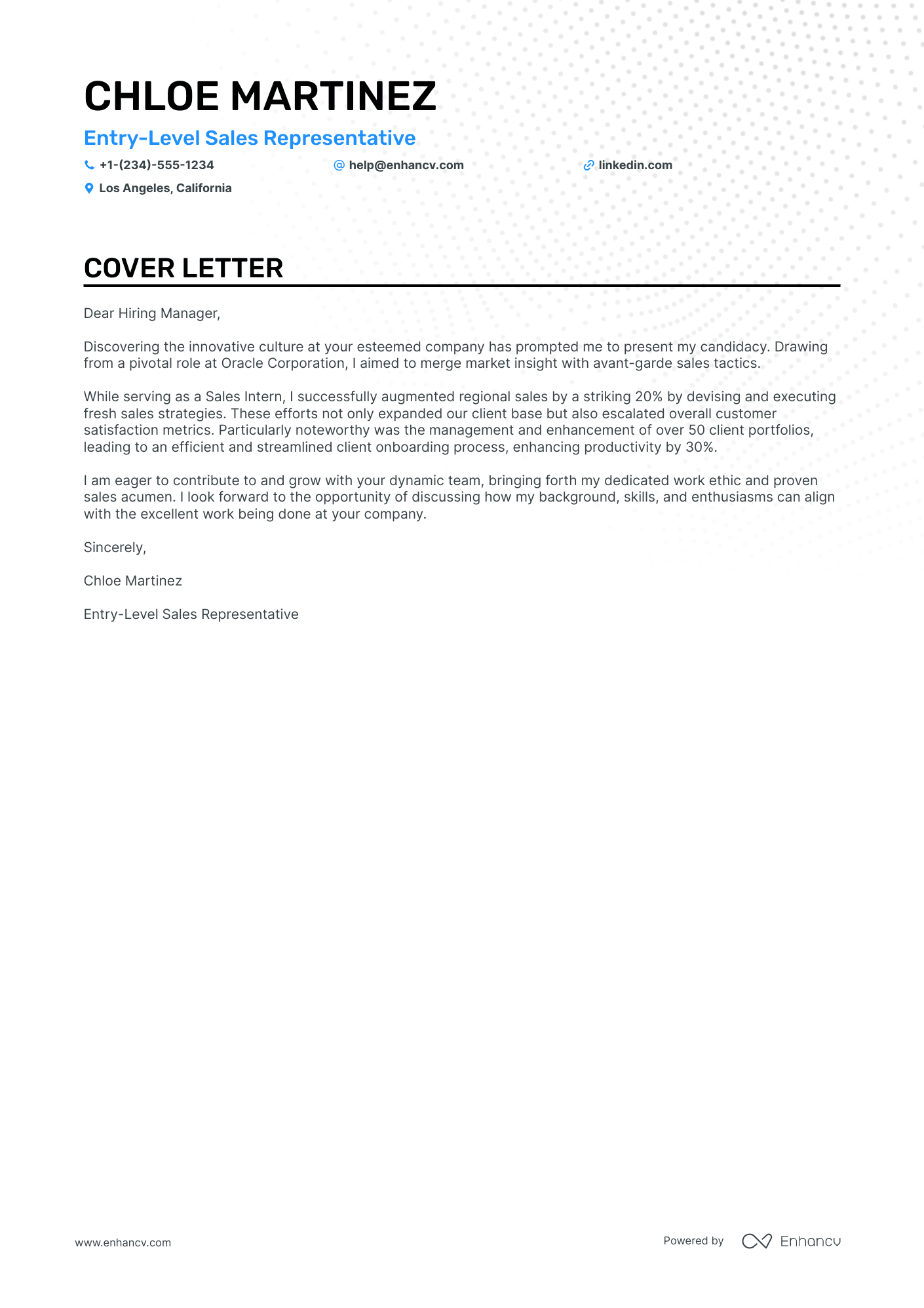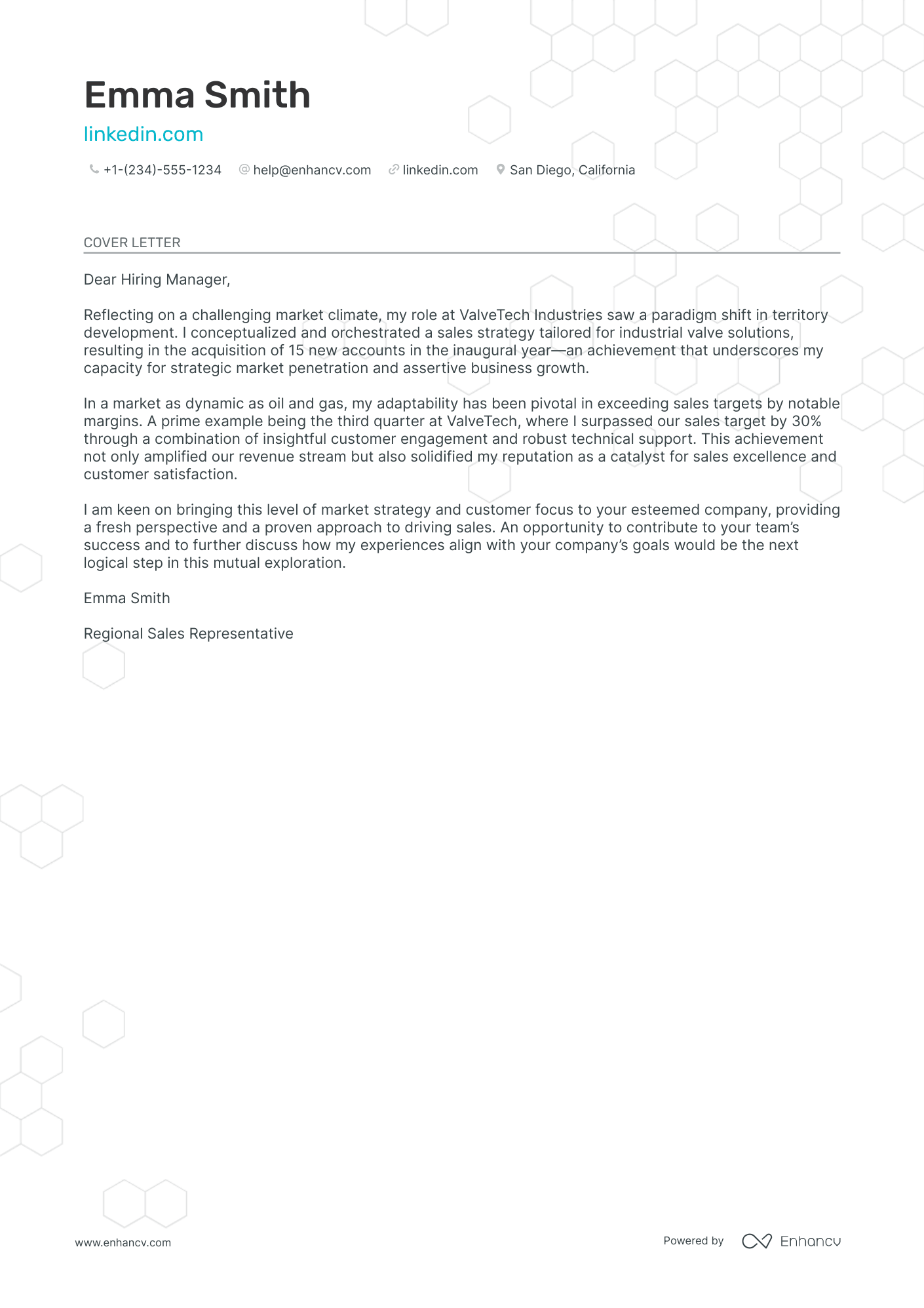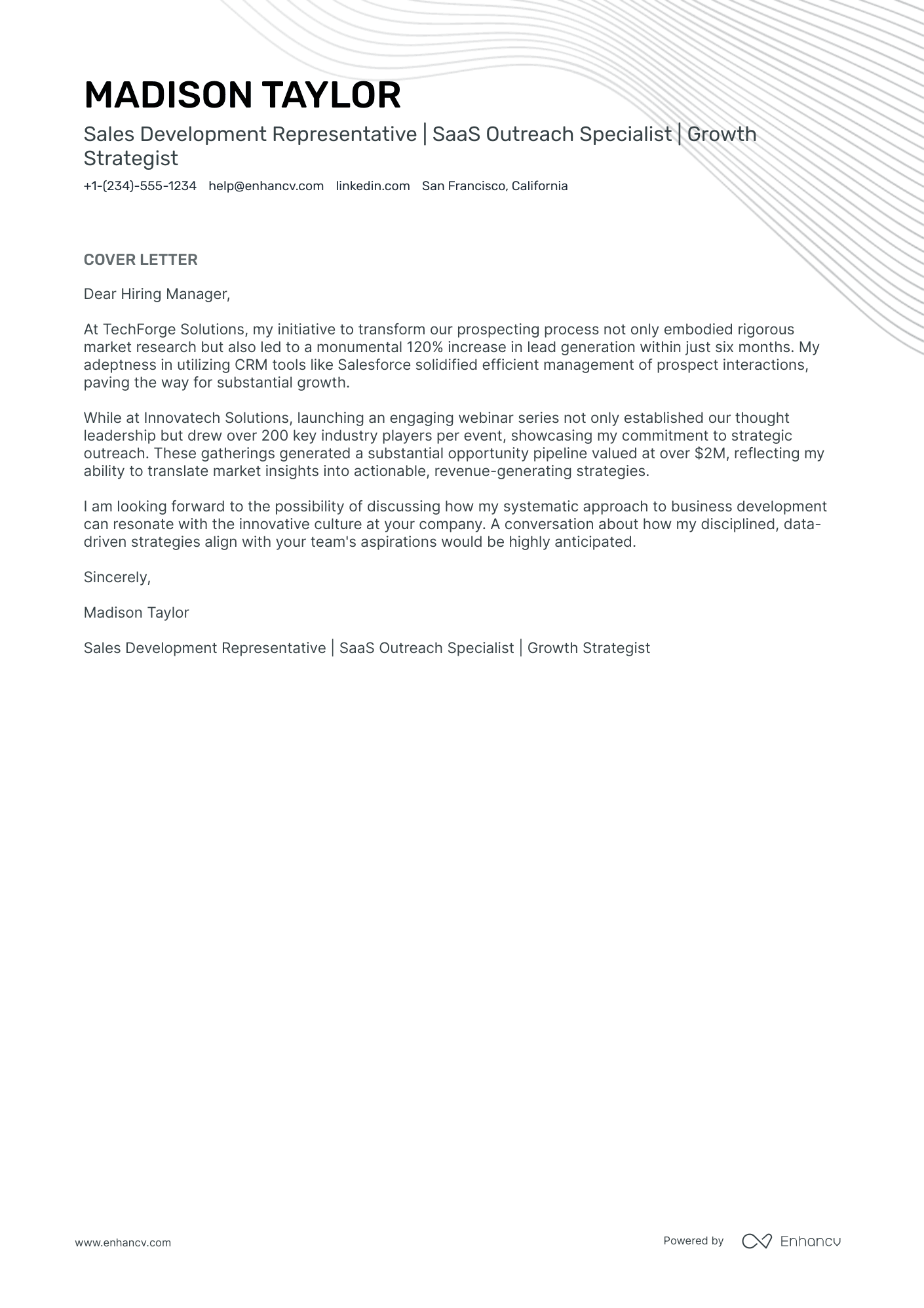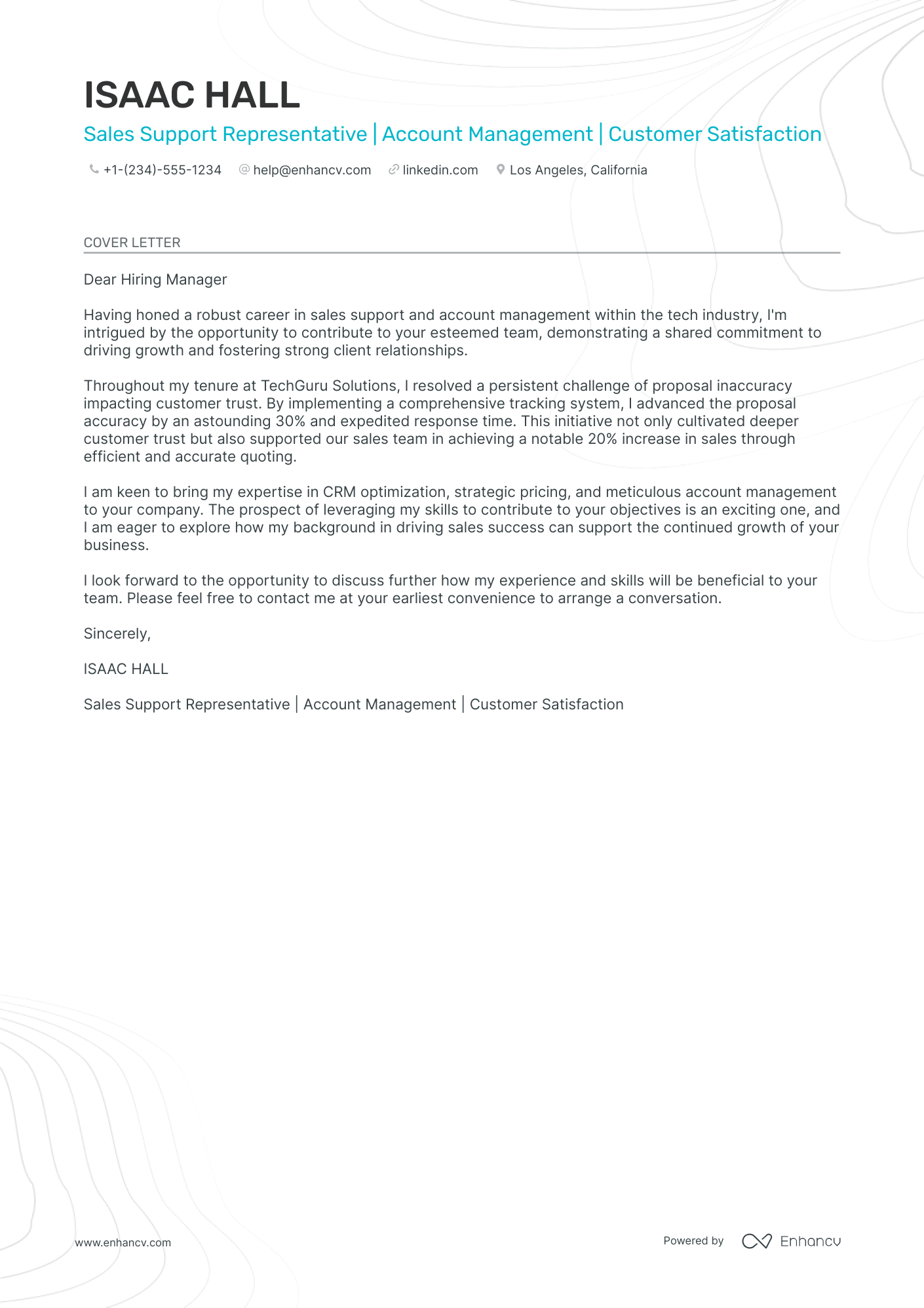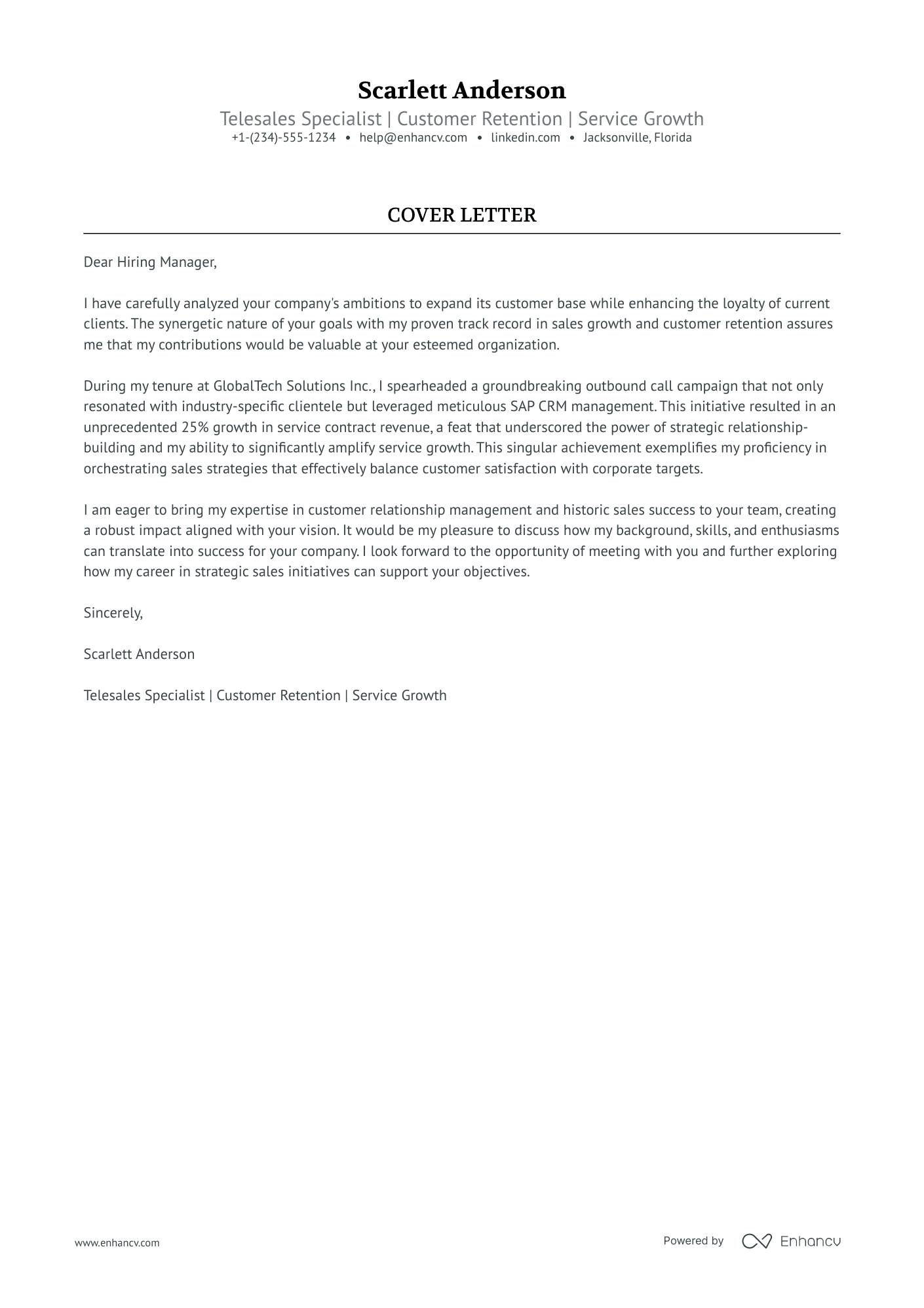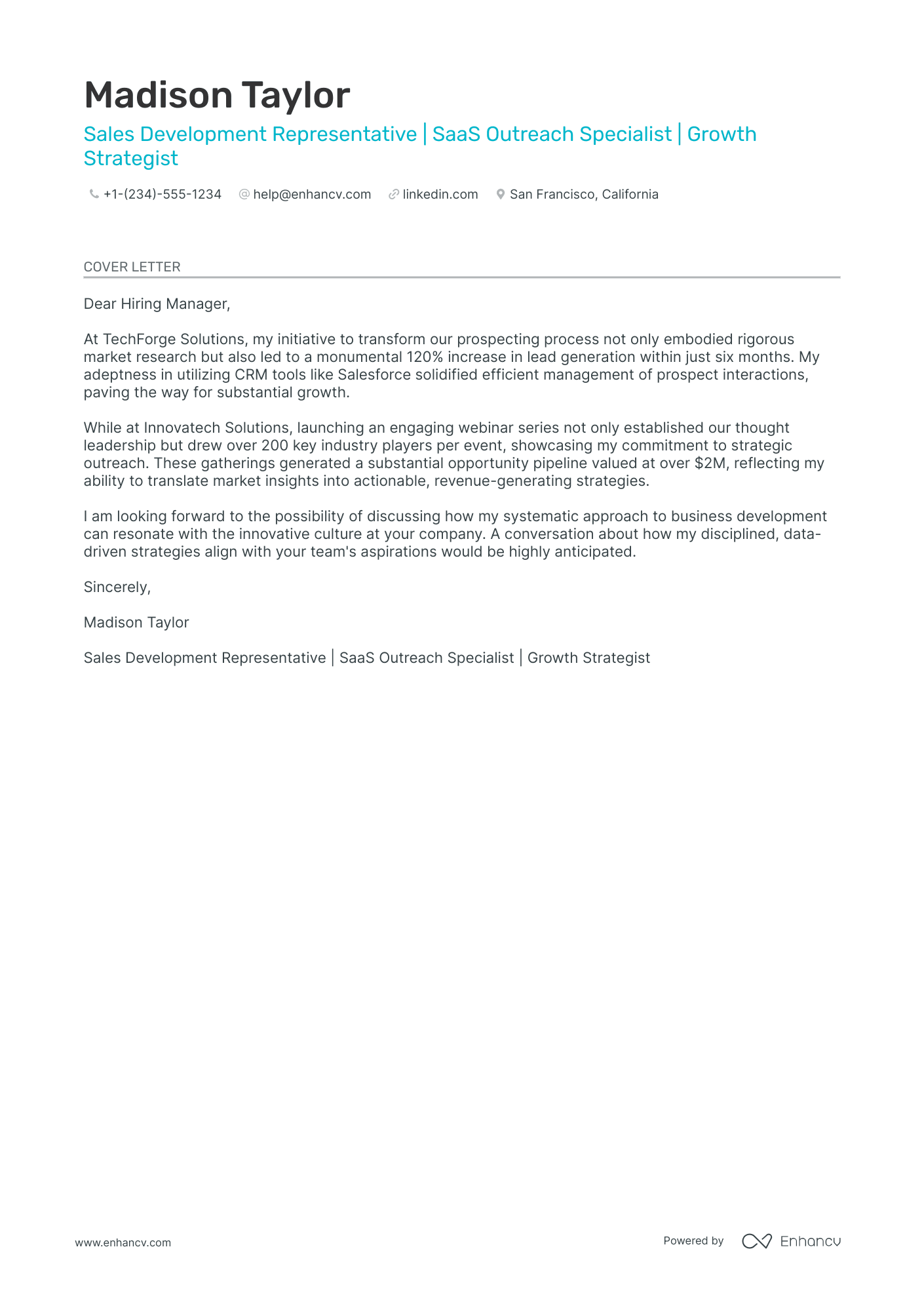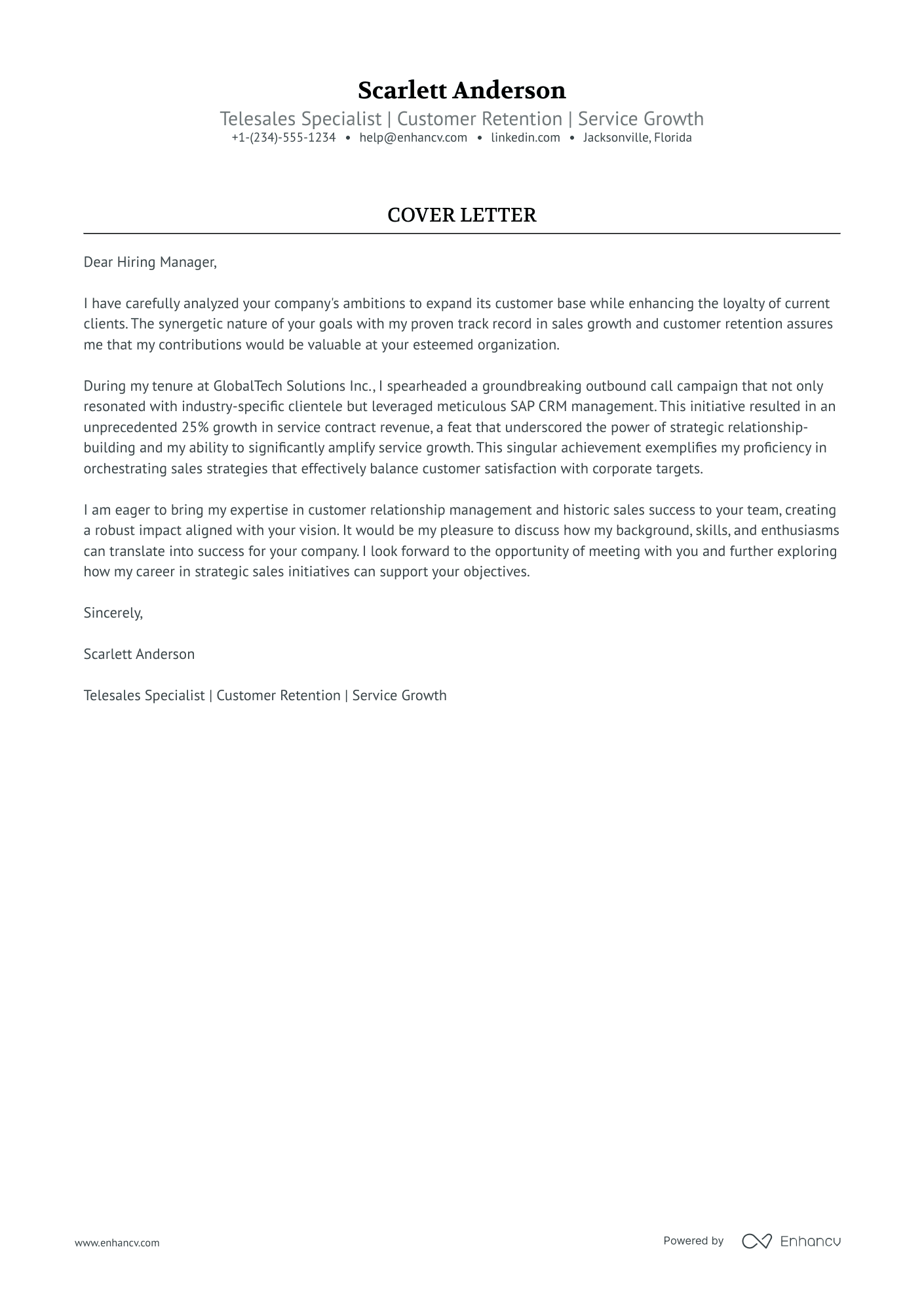Crafting a sales representative cover letter can be daunting, especially if you're deep into the job hunt and realized it's a crucial step you can't skip. Instead of echoing your resume, your cover letter should spotlight your proudest achievement with a compelling story. Striking the right balance between formality and originality means steering clear of clichés. Remember, brevity is key – keep it to one page to make a strong, concise impression.
- Step your best foot forward in the sales representative cover letter introduction;
- Be inspired by other professionals' certified cover letters;
- Structure your sales representative cover letter to feature what matters most;
- Close off your sales representative cover letter to make a memorable impression on recruiters.
But where to start writing? Upload your resume into Enhancv's AI, which will prepare your sales representative cover letter (all you need to do is personalize it, and you'll be good to go).
If the sales representative isn't exactly the one you're looking for we have a plethora of cover letter examples for jobs like this one:
Drop your resume here or choose a file.
PDF & DOCX only. Max 2MB file size.
Sales representative cover letter example
Payton Webster
Cleveland, OH
+1-(234)-555-1234
help@enhancv.com
- Quantifiable achievements: The cover letter highlights specific achievements, such as improving sales efficiency by 25% and securing a $1.5 million revenue increase. This not only demonstrates the candidate's capability but also shows potential employers their ability to produce tangible results.
- Relevant experience: Citing the leadership role in managing sales representatives and reaching a record sales milestone of $5 million speaks to the candidate's ability to successfully oversee and motivate a team, which is crucial for a Sales Representative position.
- Strategic initiatives: The implementation of a revamped CRM system shows the candidate's strategic thinking and problem-solving skills. It illustrates their proactive approach to enhancing customer relationships and operational efficiency – key aspects of a business development role.
The format of your sales representative cover letter: structure, fonts, margins, and more
Your sales representative cover letter should include a header (with your name, position, and date); a greeting and introductory paragraph; a body and closing paragraphs; and an optional signature.
Remember that you're writing your sales representative cover letter for recruiters - as the Applicant Tracker System won't scan this content.
Here are a few more tips and tricks to keep in mind when formatting your sales representative cover letter:
- Use the same font in your sales representative cover letter and resume. We recommend modern fonts, e.g. Lato and Rubik, to help you stand out, instead of the stereotypical Arial and Times New Roman.
- Each paragraph should have single spacing, which is already set up for you in our cover letter templates.
- Our cover letter builder follows industry standards for your sales representative cover letter formatting - with a one-inch margin, surrounding your content.
- Always export your sales representative cover letter in PDF to ensure the image or text quality stays the same and your writing isn't moved about.
No time for a cover letter? Use our free cover letter generator and craft one effortlessly from your resume.
The top sections on a sales representative cover letter
- Header: This section includes the applicant's contact information, the date, and the recruiter's contact information, providing a professional appearance and easy reference for follow-up.
- Greeting: Personalize the greeting by addressing the hiring manager by name, which demonstrates attention to detail and a personalized approach, key skills in sales.
- Introduction: Open with a strong statement that summarizes the candidate's enthusiasm for the role and relevant experience, grabbing the recruiter's attention and mirroring the ability to quickly engage a potential client.
- Sales Pitch Body: Focus on previous sales achievements, quantifiable results, and relationship-building skills, likening the cover letter to a sales pitch where the candidate is the product.
- Strong Closing Call to Action: End with a compelling closing that reiterates interest in the position and includes a proactive call to action, reflecting the sales expertise in closing deals and moving forward to the next step.
Key qualities recruiters search for in a candidate’s cover letter
- Proven sales track record: Demonstrates ability to meet and exceed sales targets, illustrating a history of success and goal achievement.
- Persuasive communication skills: Essential for convincing customers to purchase products or services and effectively addressing objections.
- Relationship-building expertise: Important for developing and maintaining strong connections with clients, leading to increased loyalty and repeat business.
- Adaptability and flexibility: Allows for adjusting sales techniques and strategies to different clients or market changes, ensuring consistent performance.
- In-depth product knowledge: Enables the sales representative to confidently discuss product features, benefits, and value propositions with potential buyers.
- Negotiation and closing abilities: Critical for securing deals and ensuring profitability, showcasing the representative’s skill in finalizing sales effectively.
Greeting recruiters with your sales representative cover letter salutation
What better way to start your conversation with the hiring manager, than by greeting them?
Take the time to find out who the professional, recruiting for the role, is.
Search on LinkedIn, the company website. And for those still keen on making a fantastic first impression, you could even contact the organization, asking for the recruiter's name and more details about the job.
Address recruiters in the sales representative greeting by either their first name or last name. (e.g. "Dear Anthony" or "Dear Ms. Smarts").
If you're unable to discover the recruiter's name - don't go for the impersonal "To whom it may concern", but instead use "Dear HR team".
List of salutations you can use
- Dear Hiring Manager,
- Dear [Recipient's Name],
- Dear [Department] Team,
- Dear [Company Name] Recruiter,
- Dear [Job Title] Hiring Committee,
- Dear [Mr./Ms./Dr.] [Last Name],
Your sales representative cover letter intro: showing your interest in the role
On to the actual content of your sales representative cover letter and the introductory paragraph.
The intro should be no more than two sentences long and presents you in the best light possible.
Use your sales representative cover letter introduction to prove exactly what interests you in the role or organization. Is it the:
- Company culture;
- Growth opportunities;
- Projects and awards the team worked on/won in the past year;
- Specific technologies the department uses.
When writing your sales representative cover letter intro, be precise and sound enthusiastic about the role.
Your introduction should hint to recruiters that you're excited about the opportunity and that you possess an array of soft skills, e.g. motivation, determination, work ethic, etc.
Storytelling in the middle (or body) of your sales representative cover letter
You've got your whole resume sorted, detailing your achievements and skills. What else can you write in your sales representative cover letter?
For starters, take the time to re-assess the job requirements and re-discover the most crucial skills and requirements (or keywords).
After making a list of these important keywords, look back on your experience to select just one of your past accomplishments.
Choose the achievement that is the most noteworthy, relevant to the role, and matches the required skills.
Use the next between three and six paragraphs to narrate how:
- you've grown your skill set, thanks to your achievement;
- you'd use the know-how you've gained in your new role;
- your accomplishment could help your potential employers grow.
Remember that recruiters don't need a retelling of your whole resume, but want to find out what makes you, you.
Final words: writing your sales representative cover letter closing paragraph
The final paragraph of your sales representative cover letter allows you that one final chance to make a great first impression.
Instead of going straight to the "sincerely yours" ending, you can back up your skills with a promise of:
- how you see yourself growing into the role;
- the unique skills you'd bring to the organization.
Whatever you choose, always be specific (and remember to uphold your promise, once you land the role).
If this option doesn't seem that appealing to you, close off your sales representative cover letter with a follow-up request.
You could even provide your availability for interviews so that the recruiters would be able to easily arrange your first meeting.
No experience sales representative cover letter: making the most out of your profile
Candidates who happen to have no professional experience use their sales representative cover letter to stand out.
Instead of focusing on a professional achievement, aim to quantify all the relevant, transferrable skills from your life experience.
Once again, the best practice to do so would be to select an accomplishment - from your whole career history.
Another option would be to plan out your career goals and objectives: how do you see yourself growing, as a professional, in the next five years, thanks to this opportunity?
Be precise and concise about your dreams, and align them with the company vision.
Key takeaways
We hope this sales representative cover letter writing guide has shown you how to:
- Format your sales representative cover letter with the mandatory sections (e.g. header, greeting, intro, body, and closing) and select the right font (P.S. It should be the same as the one you've used for your resume);
- Substitute your lack of professional experience with your most noteworthy achievement, outside of work, or your dreams and passions;
- Ensure recruiters have a more personalized experience by tailoring your cover letter not just to the role, but to them (e.g. writing their first/last name in the salutation, etc.);
- Introducing your biggest achievement and the skills it has taught you in your sales representative cover letter body;
- Write no more than two sentences in your sales representative cover letter introduction to set the right tone from the get-go.
Sales Representative cover letter examples
By Experience
Entry-Level Sales Representative
By Role
